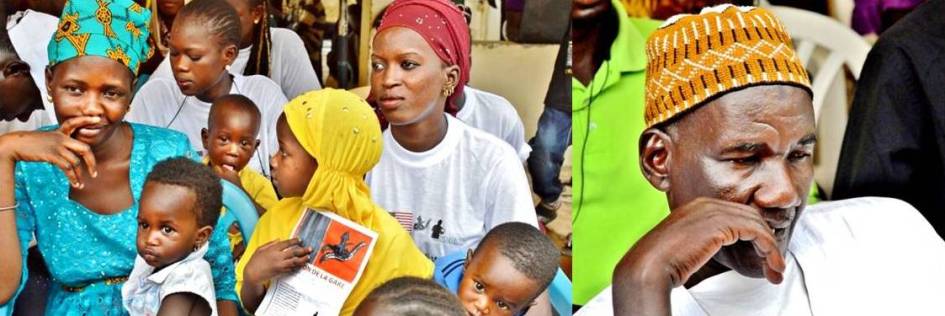News from Maison de la Gare
It Must End!
Tweeter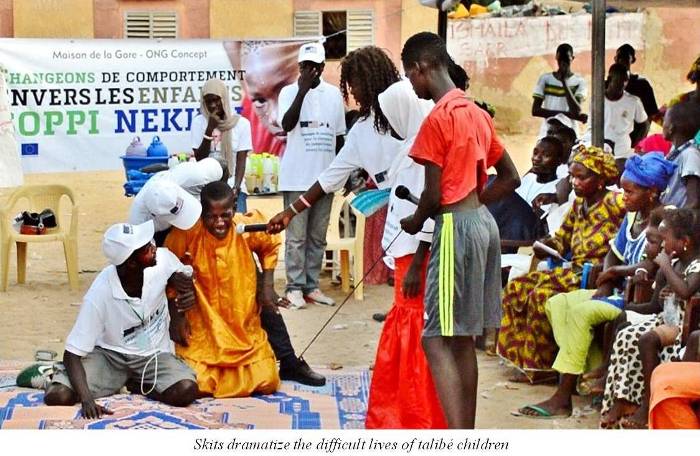
Maison de la Gare acts to stop the evil of talibé begging at its source
The begging talibé children of
Saint-Louis do not, for the most part, come from this region. They are mainly
from the areas of Matam, Kaolack, Tambacounda and Kolda.
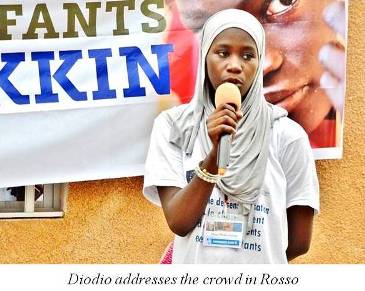 Others come from
neighboring countries, in particular Guinea Bissau, Guinea, Gambia and Mauritania.
Thousands of families continue to send their young children to Saint Louis to
learn the Koran, usually in total ignorance of the fate that awaits them there.
To make any progress at all in the struggle to end begging, we must make
these families aware of the lives to which they are condemning their children.
Others come from
neighboring countries, in particular Guinea Bissau, Guinea, Gambia and Mauritania.
Thousands of families continue to send their young children to Saint Louis to
learn the Koran, usually in total ignorance of the fate that awaits them there.
To make any progress at all in the struggle to end begging, we must make
these families aware of the lives to which they are condemning their children.
Our goal is to reduce the number of begging talibé children in Saint Louis by at
least a quarter by the end of the year 2019. It was to have a measure of our success
towards this goal that we undertook the first complete census of begging talibé children
in Saint Louis in early 2016. The result revealed
14,779 begging talibé children living in 197 daaras. We will redo the census
at the end of 2019 in order to measure the progress that has been made.
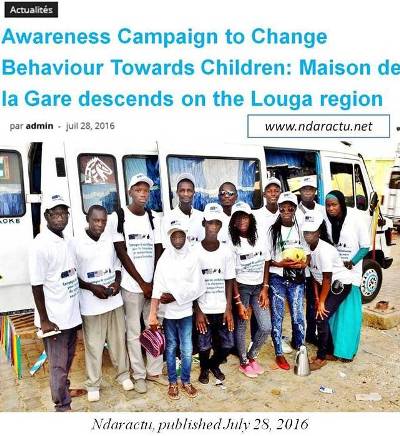
We have carried out three major awareness campaigns so far, each of them with
day-long stops in several towns or villages. For the first, we organized programs
in the towns of Louga, Rosso and Bokhol in northwestern Senegal. These campaigns
were mainly aimed at local marabouts and ndéyous daaras (The term ndeyou daara
refers to unofficial “godmothers” who take one or more talibé children under their
wings. The difficult living conditions of the children in their daaras have led
to the formation of groups of these women, full of good will, in specific areas
of their towns.)
The exchanges were very productive. Indeed, some well-organized marabouts shared
how they try to strike a balance between, on the one hand, their obligation to
maintain and feed the hundreds of children entrusted to them despite their low
incomes, and on the other hand their awareness of the need to stop forced begging.
With the help of the ndéyous daaras in their areas, many of the children receive
three meals a day, clothing and some supplies such as soap, toothbrushes
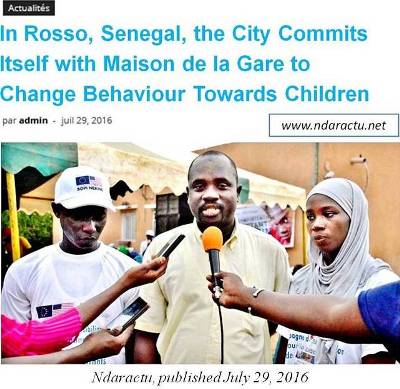 and
toothpaste. For these lucky children, they can pursue their Koranic studies
without spending hours in the street.
and
toothpaste. For these lucky children, they can pursue their Koranic studies
without spending hours in the street.
This is how the on-line newspaper Ndaractu reported the first session of the
first campaign, in Louga:
"This Thursday morning a large contingent from Maison de la Gare descended
on the Louga region to mount an awareness campaign with the objective of
changing behaviour towards children. It was led by Diodio Calloga, the
coordinator of the project to improve the living conditions of talibé
children, street children and children in vulnerable situations. The choice
of Louga was far from random as there are a great many daaras in the region
with children living under vulnerable conditions that most people are
unaware of.
A vigorous debate on the theme of the day ensued at the Serigne Sam Mbaye
Cultural Center, after the theater troupe’s performance highlighting the
problems that 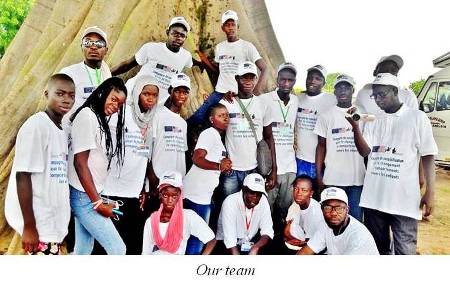 children face. This rich day of teaching was also an
opportunity for the project to donate mosquito nets, detergent, bowls,
soap and milk to the daaras. The initiative was
welcomed by the spokesman of the national federation of daaras, Thierno Kâ,
who acknowledged - with good reason - the efforts of the project organizers.
He declared that: ‘Coming to Louga, the project coordinator has involved us
in all of the preparations to make this day of awareness a success.’
children face. This rich day of teaching was also an
opportunity for the project to donate mosquito nets, detergent, bowls,
soap and milk to the daaras. The initiative was
welcomed by the spokesman of the national federation of daaras, Thierno Kâ,
who acknowledged - with good reason - the efforts of the project organizers.
He declared that: ‘Coming to Louga, the project coordinator has involved us
in all of the preparations to make this day of awareness a success.’
Even better, in the course of the day the ndéyous daaras, the marabouts and
the other participants explored ways to change people's behavior towards
children, so as to respect and reinforce the government’s decision to get
begging children off the streets."
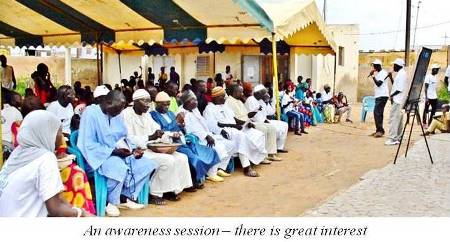
In Rosso, the initiative was welcomed by the city government. Here is the
report from Ndaractu:
"It was in the heart of the municipality of Rosso, Senegal, that the
activities of the caravan dedicated to raising awareness and
changing behavior towards children took place. Deputy Mayor Abdou Diagne declared
that children’s situation is generally acceptable, but the fact can’t be
hidden that there are some who are in difficulty. Welcoming the
government’s decision to remove children from the streets, he asked
everyone to behave responsibly towards these children while saying:
'Rosso is a transit zone where the authorities have taken all necessary
steps stop those who want to harm children.' The Deputy
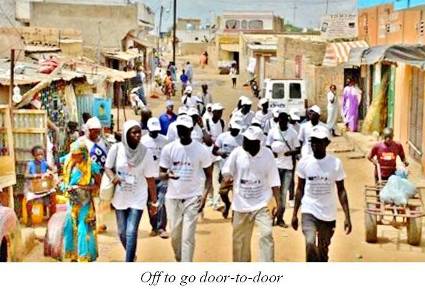 Mayor welcomed
Maison de la Gare’s efforts and the support offered by ASC Daradji (the
Sports and Cultural Association that welcomed us and organized the
events in Rosso)."
Mayor welcomed
Maison de la Gare’s efforts and the support offered by ASC Daradji (the
Sports and Cultural Association that welcomed us and organized the
events in Rosso)."
The second series of campaigns, in August, focussed on the Kaolack region
(Thiolongaane, Kaolack commune, Latmingue, Thiofyoor, Ndiaafat) and the
third series in November on Fouta (Tarédji, Djoum, Guédé). The choice
of these regions was not arbitrary. Indeed, we know that they
are major sources of begging talibé street children. Most of the
children found living on the street in Saint Louis and returned to their
communities of origin come from Saloum or Fouta. These awareness sessions
gave us the opportunity to make the people of these areas aware of what
most begging talibé children must endure. Using photographs and
brochures, theatrical skits and questions and answers, we succeeded in
focussing people’s attention in the villages where these children come from
on the reality of their lives. On the fact that children sent to
learn the Koran 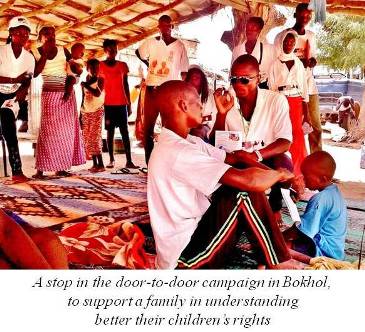 are often victims of many types of abuse and
exploitation.
are often victims of many types of abuse and
exploitation.
The truth is that children sent to Saint Louis to study
the Koran usually become victims of one of the worst forms of
contemporary slavery, spending most of their time begging.
We learned a lot from these first awareness campaigns. We plan to
mount at least twelve new campaigns in 2017 and twelve more in 2018.
We will do everything in our power to help communities that entrust
their children to Saint-Louis marabouts and daaras to understand the
impact of their actions on their children, and to find better
alternatives.
Children begging in the streets must stop!
________
This awareness program was made possible by a grant from the European Union,
for which we are grateful.











